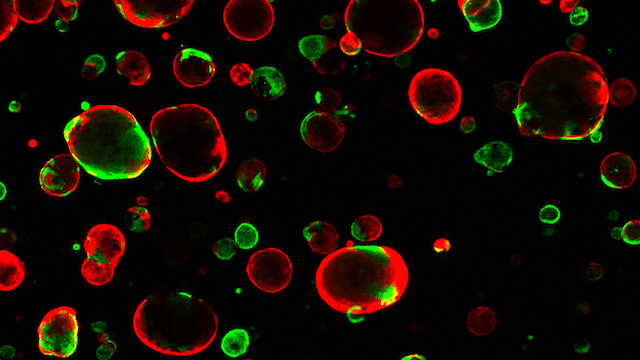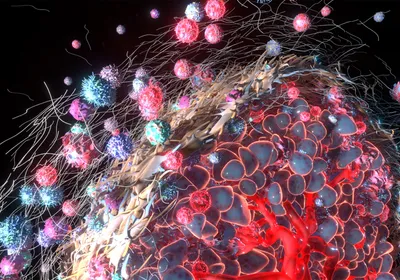 Organoids grown from pancreatic tissue. Red-colored organoids are composed of normal cells; green organoids are grown from pancreatic tumor samples.TUVESON LAB, CSHLPancreatic ductal adenocarcinoma (PDA), a common form of pancreatic cancer, is often fatal due to its high tendency to metastasize. In a study published today (July 27) in Cell, scientists have uncovered a mechanism in mice that may be driving the spread of this cancer.
Organoids grown from pancreatic tissue. Red-colored organoids are composed of normal cells; green organoids are grown from pancreatic tumor samples.TUVESON LAB, CSHLPancreatic ductal adenocarcinoma (PDA), a common form of pancreatic cancer, is often fatal due to its high tendency to metastasize. In a study published today (July 27) in Cell, scientists have uncovered a mechanism in mice that may be driving the spread of this cancer.
To examine the changes that promote cancer metastasis, researchers first developed organoids using primary tumor and metastatic cells from a mouse model of PDA. By comparing these mini organs, the team found that metastatic organoids had more active enhancers, short DNA sequences that bind to transcription factors to enhance gene expression, than the ones derived from primary tumor cells.
Further analysis revealed that FOXA1, a protein active during embryonic development, was binding to these enhancers. In addition, cells with higher levels of this molecule displayed an increased expression of genes found during earlier developmental states.
“We show that to metastasize, the cell has to change, in effect, its whole telecommunications network—its enhancers are being reprogrammed,” study co-author Christopher Vakoc, a cancer epigenetics researchers at Cold ...























